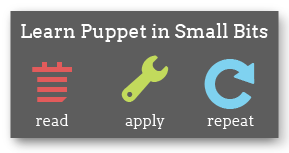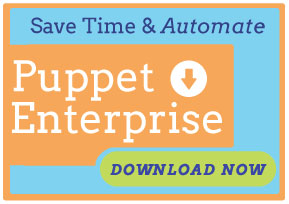A newer version of Puppet Enterprise has been released!
Navigation
- Introduction
- Overview
- Installing
- Upgrading
- Using Puppet Enterprise
- The Accounts Module
- Puppet Compliance
- Known Issues
- Troubleshooting
- Answer File Reference
Known Issues in Puppet Enterprise 1.2
The following is a list of known issues in each maintenance release of Puppet Enterprise 1.2. To find out which issues you are affected by, run /opt/puppet/bin/puppet --version, the output of which will look something like 2.6.9 (Puppet Enterprise 1.2.3).
In PE 1.2.6 and Earlier
Several Security Issues
Several security issues were discovered in PE 1.2.6. Some of them were hot-fixed, and all of the fixes have been rolled into the packages for PE 1.2.7. The issues are:
*CVE-2013-1655 Unauthenticated Remote Code Execution Vulnerability *CVE-2013-1654 SSL Protocol Downgrade Vulnerability *CVE-2013-1653 SSL Remote Code Execution Vulnerability *CVE-2013-1652 Insufficient Input Validation Vulnerability *CVE-2013-1640 Agent Remote Code Execution Vulnerability *CVE-2013-2274 Agent Remote Code Execution Vulnerability— Puppet 2.6 Only *CVE-2013-2275 Incorrect Default Report ACL Vulnerability
In PE 1.2.5 and Earlier
Several Security Issues
Several Ruby on Rails related security issues were hot-fixed in PE 1.2.5. All of these fixes have been rolled into the packages for PE 1.2.6. The issues are:
- CVE-2013-0333 Rails JSON Parser Vulnerability
- CVE-2013-0155 Rails (ActiveRecord) Unsafe Query Generation Risk
- CVE-2013-0156 Rails (ActionPack) SQL Injection Vulnerability
- CVE-2012-5664 Rails (ActiveRecord) SQL Injection Vulnerability
In PE 1.2.4 and Earlier
Several Security Issues
The following ten security issues were discovered after the release of PE 1.2.4. They were all resolved with hotfixes for PE 1.2.x at the time they were announced.
In October 2012, PE 1.2.5 was released. PE 1.2.5 incorporates all of these fixes, as well as additional stability and security improvements in the bundled prerequisites.
Note that PE 1.2.5 will limit your upgrade options: Systems running PE 1.2.5 can only upgrade to PE 2.6.1 or higher.
This is because some of the packages it includes are newer than those in earlier PE 2.x releases.
- CVE-2012-3864 – Arbitrary File Read
- CVE-2012-3865 – Arbitrary file delete/D.O.S on Puppet Master
- CVE-2012-3867 – Insufficient Input Validation
- CVE-2012-1906 – Arbitrary Code Execution
- CVE-2012-1986 – Arbitrary File Read
- CVE-2012-1987 – Denial of Service
- CVE-2012-1988 – Arbitrary Code Execution
- CVE-2012-1053 – Puppet Resource Local Group Privilege Escalation
- CVE-2012-1054 – K5login Local User Privilege Escalation
- CVE-2012-0891 – Dashboard Cross Site Scripting (XSS) Vulnerability
Upgrading From PE 1.1 Breaks Node Classification on Debian and Ubuntu Systems
When upgrading a puppet master with Dashboard from PE 1.1 to 1.2 on Debian and Ubuntu systems, a permissions change to /etc/puppetlabs/puppet-dashboard and /etc/puppetlabs/puppet-dashboard/external_node breaks Dashboard’s node classification abilities. The symptom of this issue is that classes that applied properly to agents on PE 1.1 will no longer be applied.
The workaround for this issue is to ensure that the permissions of /etc/puppetlabs/puppet-dashboard are 755 and that the permissions of /etc/puppetlabs/puppet-dashboard/external_node are 755. Running the following command should be sufficient:
$ sudo chmod 755 /etc/puppetlabs/puppet-dashboard /etc/puppetlabs/puppet-dashboard/external_node
This issue only affects Debian/Ubuntu systems being upgraded from PE 1.1 to 1.2.x with a combined master/Dashboard installation.
Accounts Class Requires an Inert Variable/File
The accounts class — a data-separation wrapper that uses external data to declare a set of accounts::user resources — will not function unless a $users_hash_default variable (if using the namespace data store) or accounts_users_default_hash.yaml file (if using the yaml data store) is present, even though this variable/file is never used when creating resources.
The workaround is to ensure that this variable/file is present in the namespace or data directory.
In PE 1.2.3 and Earlier
Major Security Issue: AltNames Vulnerability (CVE-2011-3872)
The CVE-2011-3872 AltNames vulnerability, patched in PE 1.2.4, affects all prior PE installations. If your site has ever had any version of PE prior to 1.2.4 installed, your node population contains dangerous certificates which can be used to impersonate the puppet master and gain control of nodes.
Upgrading PE is insufficient to protect your site — you must also specifically mitigate the vulnerability. You should download and use Puppet Labs’ remediation toolkit module; see the README files included with the module for full documentation.
In PE 1.2.2 and Earlier
Three Security Issues: CVE-2011-3869, CVE-2011-3870, and CVE-2011-3871
Three security vulnerabilities in Puppet (CVE-2011-3869, CVE-2011-3870, and CVE-2011-3871), which allowed local privilege escalation, were fixed in Puppet Enterprise 1.2.3. If you are running Puppet Enterprise 1.2.2 or earlier, you must upgrade to version 1.2.3 or install the security hotfix for this issue.
Information about security issues is always available at http://puppetlabs.com/security, and security hotfixes for all supported versions of Puppet Enterprise are always available at http://puppetlabs.com/security/hotfixes. For email notification of security issues, make sure you’re on the PE-Users mailing list.
In PE 1.2.1 and Earlier
Security Issue: CVE-2011-3848
A security vulnerability in Puppet (CVE-2011-3848), which allowed unsafe directory traversal when saving certificate signing requests, was fixed in Puppet Enterprise 1.2.2. If you are running Puppet Enterprise 1.2.1 or earlier, you must upgrade to version 1.2.3 or install the security hotfix for this issue.
Information about security issues is always available at http://puppetlabs.com/security, and security hotfixes for all supported versions of Puppet Enterprise are always available at http://puppetlabs.com/security/hotfixes. For email notification of security issues, make sure you’re on the PE-Users mailing list.
In PE 1.2.0
Puppet Inspect Does Not Archive Files
In puppet.conf, the archive_files = true setting was incorrectly placed in an inert [inspect] block. This caused puppet inspect to not upload files when submitting compliance reports.
To repair this issue, edit your puppet.conf file to include archive_files = true under the [main] block. This will not happen automatically when upgrading from PE 1.2.0 to 1.2.1, but is fixed in new installations of PE 1.2.1.

